Parenting: What do I do with defensiveness?
So this post has been on a journey. To be totally transparent, this one was written in my journal last August, but it still holds true. Then, I wrote it here and somehow didn’t move it from drafts. Now, nearly 2 months later, here it is. Life.
A few weeks ago I had this moment while talking with my 10-year-old. I was trying to give him some basic feedback and redirect him. His go-to response was to immediately talk over me to tell me why he’s doing nothing wrong. Initially, I felt perplexed, and honestly, frustrated. Usually, I just want this moment of discipline to be over so we can get back to whatever we were doing. It’s usually way more fun than discipline. But he’s talking over me. And definitely not listening. UGH! I imagine many parents can relate to this. The narrative of not tolerating this type of “disrespect” is strong in most cultures.
Credit Unsplash: Mick Haupt
But here’s the thing. If my kid is acting defensive, his brain is kicking in to respond to something threatening. That’s what defensiveness is. Ok, I am guessing you can be on board so far. But here’s the challenge. Guess what the threat is in that moment—me. Now, to be clear, I work very hard to parent from a place that does not induce fear. I am not punitive; I don’t make threats; and I rarely yell (listen, we all do sometimes, so if you’re shaming yourself, stop). I am not a parent who uses threats to get compliance, and I don’t recommend any of these strategies to my clients. But my child’s attachment system responds to any perceived threats to our relationship as if they are real, and me being upset with him (whether I am or not) is a threat. I may think I am just redirecting, explaining a safety issue, or helping him make different, more productive choices. He hears, “Mom is angry with me,” and his system goes into overdrive trying to make sure our relationship, upon which he depends to get his needs (physical AND emotional) met, is restored to solid ground. In his 10-year-old mind, the best way to do this is “Who me? You don’t have any reason to be mad at me. I didn’t do anything wrong.”
This brings us to a decision point, folks. In my scenario, I can keep going with my adult worldview. In this, I can simply punish him for talking over me and not listening to me. I mean, I wasn’t doing anything wrong, yeah? That’s one option. If I do this, he is left with the belief that I was actually mad at him, his experience of the impact of my behavior doesn’t matter, and he better just shut up and take my perspective as the truth. Whoa! Wait a minute! I don’t want him to learn that. That message is not helpful, and it certainly doesn’t accomplish my original goal. It also does not teach him anything about healthy, responsive relationships so he can have some of those someday.
Credit Pexels: Kindle Media
Alternatively, I can pause a moment and check in with him and reassure him. I can try to get in his world and perceive what he is perceiving. If I pause to remove his experienced threat to our relationship, I teach him that he’s safe and that feedback offered from a caring other is ok, something that can be taken in and considered with no threat to self. And then I can give him the feedback I was initially trying to give. So remember, your child’s attachment system can perceive your behavior as threatening, whether or not you intend to be threatening. Your best bet is to attend to that FIRST and FOREMOST. Then, you can more successfully accomplish the original goal of getting them to change a particular behavior. They cannot hear this when their reactive brain is online. If you need help with this, I offer parent coaching and filial therapy, with a focus on attachment and our latest understandings of how the brain works within the context of the caregiver-child relationship. Reach out here.

